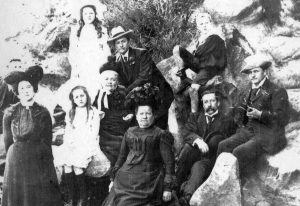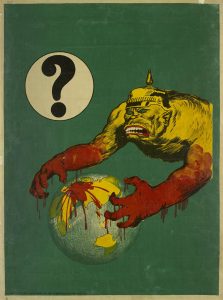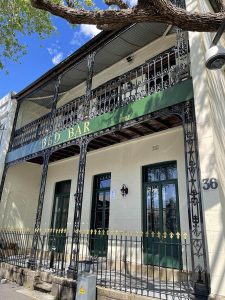by Simon Bohrsmann, Bulletin 10/2022, December 2022
In the first year of WW1, a fist fight breaks out on a Bondi tram between the colourful Glebe baker Christian Raith and a younger man named William Dawkins. Other passengers claim Raith, a German, shouts he wishes he was back home to lend a hand in the war.
They tell him to shut up ‘in view of the present very high tension’. The tram stops and the combatants tumble outside and Raith knocks Dawkins to the ground and is on top of him when police charge in and arrest him. Raith is fined £2 or two weeks in prison for riotous behaviour, and Dawkins escapes with a few bruises.
It’s a local angle on the war and one newspaper headline declares: ‘Britisher and German Fight’.
The punch-up is a glimpse of the anti-German hysteria that swept Australia at the time. People turned on their neighbours and German Australians became the ‘enemy within’ and were ostracised, abused and even locked up.
At the time of his scraps Christian Raith, 54, had lived in Australia for 33 years since he had worked his ship’s passage as a baker. He was one of more than five million Germans who left their homeland between 1820 and WW1, mostly because of politics, poverty, religion and opportunity.

I came across the story of Mr Raith the baker because he was a good friend of my great uncle, Dr Rudolph Bohrsmann, who was a big wheel in Glebe at the time, both as a local doctor and an aspiring politician. I should mention I knew very little of this until, a few years ago, when I read a story in the Glebe Society Bulletin about Rudolph, by Glebe chronicler Lyn Collingwood. Lyn’s work made me realise I had been walking alongside my family’s ghosts in Glebe, with my eyes closed.
In 1854, another emigrant to young Sydney was a 20-year-old tailor called Matthias Christian Bohrsmann from Altona, now part of Hamburg. He escaped conscription in the Schleswig Wars and he was my great grandfather and Rudolph’s father. They sang a patriotic song in Altona at the time with this line: ‘Our future lies on the far wide sea’. These emigrants included winegrowers, farmers, carpenters (and tailors).
Rudolph’s father Matthias became a very wealthy businessman and Rudolph and his three brothers (but not his two sisters) were sent to university. All became doctors. Rudolph graduated in Medicine from Sydney University in 1894 and by 1898 had set up his Glebe practice.
In 1913, Rudolph decided to run for NSW Parliament and he won a secret selection ballot against the unpopular former government minister Jimmy Hogue. Rudolph won by a thumping 876 votes to Hogue’s tally of 148. The press disliked Hogue. The Bulletin said he was ‘flooded out in a storm of enlightenment’ and the Sydney Truth declared Hogue was better at billiards than politics. A squad of policemen was close by on the night of the ballot, in case of trouble between the supporters of the two candidates.
Rudolph opened his campaign in front of a big crowd in Glebe Town Hall, on 16 September 1913. He later addressed a campaign rally from the balcony of Mr R. Miller’s house at 96 Bridge Rd, Glebe.
His younger brother, my grandfather Gustav, ran in the same election as a Liberal for Newtown. Both of them lost.
It was the Bohrsmanns’ last chance for political elevation because the following year war broke out and thereafter it was not a good time for anybody with a German name to run for public office. Rudolf and Gus and their brothers and sisters were born here, but their surname was not.
The Mirror of Australia was a newspaper, of a sort, which lasted from 1915 to 1917 and boasted its campaign had seen over 1,000 ‘Huns’ interred. The paper’s editorial line was to report the war effort and attack Germans on the home front. ‘Enemy aliens’ were sent to internment camps at Liverpool, Hay, Orange and Cowra.
The Mirror fumed about Germans living in ‘Hun-amurra’ and ‘Hun-ter’s Hill’. On 12 February 1916 The Mirror attacked a Sydney café ‘where the Hun hogs feed in Continental style’. where ‘the elite of the Hun swine still at large in Sydney’ ate Wiener Schnitzel. It got worse. The paper described ‘a repulsive creature with four chins and a thick neck’ and named ‘squareheads’ who included Australians of German or Austrian descent. What an irony the ‘schnitty’ is now a staple of Aussie pub food. But it was not funny back then.
This was the new world order for Dr Rudolph and my family. Four years before the war, Rudolph wrote a pamphlet (now in the National Archive) titled ‘Empire Day in Australia’, under the patronage of the British Empire League of Australia. Rudolph wrote: ‘There can be no nobler and purer spirit encouraged in the young than an ardent love of the land that gave them life.’ He included the lyrics and music of patriotic songs, including ‘Rule Britannia’, and instructions on the proper ways to make a Union Jack and other flags. Empire Day was a major annual event in the local schools.
In 1916, mid-war, Rudolph chaired a military recruitment meeting in Glebe, where young men were urged to sign up. More importantly, he signed up as a military officer at the Royal Military College in Duntroon, Canberra – I assume as a teacher because his obituary said he wanted to serve overseas but was sent to Duntroon instead.
He was respected for his work with the local friendly societies. Many people survived on low wages and could not afford medical fees, so instead they paid about fourpence a week into lodges set up by friendly societies so their families could see a doctor on set nights. Next door to his family home was Glebe Superior Public School (now known as Glebe Primary School) where Rudolph patched up kids hurt in playground scraps. His work at the school is still remembered today by the Dr Bohrsmann Honour Board hanging in a corridor. He was also president of the Parents Association and every year he gave a gold medal to the school dux. The family moved to a mansion down the road called Arden in Forsyth St, since demolished, but his old house at 36 Glebe Point Rd still stands and was recently occupied by an Asian restaurant, and then a bar.

The Anti-German League illustrates the toxic world my family found itself in. Audiences applauded when Germans were denounced as spies and conspirators, and the hysteria extended to shouts that the only good German was a dead German. The League wasn’t just some street rabble. It included members of parliament, aldermen, businessmen and all kinds from this young nation, which ironically was built from many nationalities.
Rudolph’s brother Gustav, up the road in Newtown, was not intimidated. He addressed meetings of the League, even denouncing German ‘kultur’. In 1916, Gustav stood in front of a conscription rally with a roaring crowd of 1,000 – most were opposed to conscription. They were so angry that only 50 people stood up for the National Anthem and the rest stayed seated with their hats on. Gustav urged young men to sign up for the fight, and someone asked if he was born in Germany. ‘No!’, he shouted back. ‘I was born in 39 Oxford St, Surry Hills. I’m an Australian. If you mean, as a doctor, am I a germ man? I say yes, for I have a knowledge of microbes, and you are the greatest microbes of cowardice the British race ever produced!’
There’s a colourful story about Dr Rudolph, which shows life wasn’t always a battle. But buried within this tale of horse racing and stolen diamonds is a nasty whiff of the racism of the day.
It was one month before the end of the war, in 1918, and Dr Rudolph, now 48, found himself in court as a witness in a case against a woman called Muzelle Elias. She was a gambler, the owner of a racehorse, and a diamond dealer.
I can’t tell you how she knew Dr Rudolph, except to note their common interest in affairs of the turf. The case against her involved a pair of diamond earrings worth £500 which Miss Elias, in her role as a diamond expert, was supposed to sell on behalf of a financier. She was accused of pawning them instead for £250. But she claimed she sold them to Dr Rudolph, and that he gave her three promissory notes for a total of £330.

In the witness box, Dr Rudolph denied buying diamonds from Miss Elias. He did say he wrote her a promissory note for £100 after a betting loss on a horse called Malena, which Miss Elias tipped him. He said he backed Malena a few times, but not when it won. This got a few laughs in the court.
Mr Loxton, KC, asked Rudolph, ‘Are you often in difficulties over your racing bets?’ There were more laughs when Rudolph replied, ‘No. Sometimes I am in temporary difficulties over racing bets.’ But there were no laughs when Mr Loxton, who represented Miss Elias, asked Dr Rudolph about his ancestry. In other words, could a German be trusted to tell the truth?
The prosecuting lawyer hit back by making it clear that Rudolph was born right here in NSW and that his brothers were Australian too. And Rudolph added his mother was English and his father was a Dane. (His father came from Altona, which was then part of Denmark, but he was German.)
Glebe historian Max Solling told me Rudolph was one of the doctors in Glebe respected for caring for the poor, between Federation and WW1. These doctors spoke out against poverty and poor housing; some, including Rudolph, were active in local politics. But during the war, says Mr Solling in his book Grandeur & Grit: A History of Glebe, Dr Rudolph ‘is ostracised and leaves the suburb in 1918’. Mr Solling also notes locals Christian Raith and August Heinrich ‘suffered in a campaign of vilification against ‘Hun’ bakers’.
Dr Rudolph and his family moved to the eastern suburbs. His son, also Rudolph, or Rudy, would shorten his surname to Mann to escape the racism of the time. Rudy went on to successfully manage the Tivoli touring companies and theatres and represented the Sadler’s Wells Opera Co. in Australia.
Rudolph senior was only 54 when he died, in the spring of 1925, in Earlsdon Private Hospital, Manly, after a heart attack while playing tennis. His funeral was at the Wood Coffill Funeral Parlour on Broadway, not far from his old home. The mourners included many Glebe identities, local councillors, the town clerk Tom Glasscock, rugby union player Harry Holden; and all-round sportsman Hyam Marks, a fellow student at Sydney Grammar and a commentator on the first live Test cricket radio broadcast. Also at the funeral was the local character and baker, German-born Christian Raith, who began this story.
Raith lived to the age of 79, and was praised as one of the best master bakers in Sydney. One of his sons was the mayor of Petersham in 1934.
(Simon Bohrsmann is a former journalist who now lives in London)









One comment. Please add yours.
Great story
My family lived in Eglinton Road from 1929 until 1990
Love Glebe